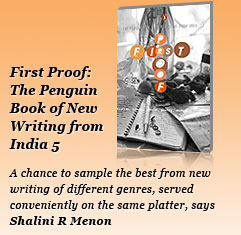First Proof: The Penguin Book of New Writing from India 5
By Shalini R Menon | 05 Mar 2010
Published by: Penguin Books India
Price: Rs250
Classification: Fiction
 Penguin Books India’s annual anthology of Indian writing in English — First Proof: The Penguin Book of New Writing from India 5 — like in the past, is a compilation of short fiction, essays, reportage, translations, sections from works in progress and poetry, from experienced writers and those new to the craft. The book follows the by-now set division into non-fiction, fiction and poetry, and explores diverse themes.
Penguin Books India’s annual anthology of Indian writing in English — First Proof: The Penguin Book of New Writing from India 5 — like in the past, is a compilation of short fiction, essays, reportage, translations, sections from works in progress and poetry, from experienced writers and those new to the craft. The book follows the by-now set division into non-fiction, fiction and poetry, and explores diverse themes.
The non-fiction pieces have as topics the unwritten codes that define women's use of public spaces in Mumbai; a woman juggling the roles of a housewife, prostitute and social worker with an in-your-face candour; the passion of anglers pursuing the sport and the secrecy surrounding their prime sites for game-fishing; first-hand accounts of the excitement and risk involved in living with guerrillas and outlaws; the depiction of Gandhism in Indian cinema through the years; the fluid interpretation of religion and community in a tiny microcosm of a region within the macrocosm that's India; and an unabashed look at sexuality within the family and community.
The intriguing details of how a utensil attains its final resting place after a lifetime through generations; childhood memories of a well-loved table; the unsuccessful attempts at being successful in business; the joy in preparing and feasting on a fish-filled dinner; a child's playful imaginings hinting at sinister tidings; the untold suffering of wives, mothers and children of 'comrades' that laid the foundation for Communism in Kerala; an excerpt from a forthcoming novel; finding that quiet inner space; the eternal comparison between this and the other side of the fence of social status; and relinquishment of traditional jewellery as a protest against the fetters of tradition provide fodder for the short stories in the fiction segment.
Love, the feelings explored, the nuances experienced, the ways in which it is expressed and the unlikely settings in which it thrives, forms the major theme of the poetry section.
On the whole, a book that lives up to the promise of serving as a showcase for new writers to display their talent and for established ones to try out theirs in new genres — a book to wait for in the future.
Excerpt from Who's Having Fun? by Shilpa Phadke, Sameera Khan and Shilpa Ranade
Women's tactical skills at playing with various disciplining boundaries are really tested when they want to access public space not for any 'necessary' purpose, but just to have some fun. And every woman differently manipulates these boundaries as she negotiates different parts of the city and inhabits different aspects of her own life. In Bandra, for example, one can be a good girl in a short skirt while in Matunga, good girls show no leg. Though of course, a Bandra girl in Matunga might be excused — for as an outsider, the rules don't apply in quite the same way. In Malabar Hill the virtuous married woman might wear a short skirt in the company of her husband, but she must hope that grand-mother-in-law won't see her as she slips out of the house. In Hiranandani, Powai, the night club is a five-minute walk away, and the short skirt is cool as long as one doesn't plan to leave the safety of the gated enclosure. In Chembur, if one is going to a night club in a private car a short skirt is acceptable, even desirable, while good Mulund girls can wear the short skirt, but not in Mulund, please.


















